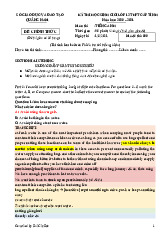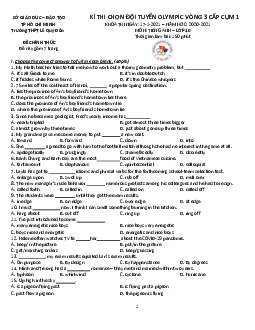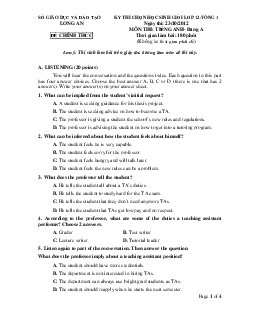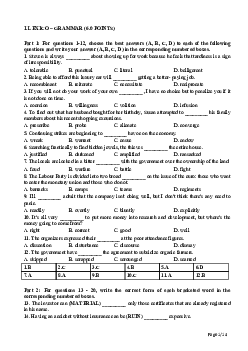







Preview text:
sO GrAo Dl)C vA DAo TAO HA NQr
KY THI CHQN DOl TUYEN HQC SINH GIOI THANH PHO Ldp 12 HQ va ten Ky Nam hQc : 2007- 2008 1. Mon thi: TIENG AND Ngay thi: 28 - 11- 2007 Thai gian lam bai: 180 phut 2. 1Phach: _I .:,
(Thl sinh lam bai vao to' giay thi nay) 'C:: Chu t!ch h<)id6ng ' =
L Listen to the conversations twice from question 31 - 46 in the tape. You Q,I ..::.c ch am thi ghi s6 phach
will hear several questions each conversation. Read the four possible 1 et ,5
answers in your paper and circle the best answer. (4,0 pts) . - '"" • :: "0
1. (Q3l). A. To invite her to go to Florida with him. o ] Ky thi .
\!B. To ask her to watch his house while he is gone. .•..
C. To make a date for that evening. -='-I'c:: D. To talk about his vacation. -=Q. Kh6a ngay: . 2. (Q32)~. She is Brian's neighbor. 3. (Q33). A. Feed the cats. '-Io·
B. She goes to school with Brian. B. Collect the mail. -: H(>i dong coi thi : .
C. She does not know Brian very well. ....-c. Water the plants. ' = <0 D. She does not have a job. D. Watch the house. "0 4. (Q34). A. Go to work.
5. (Q35). A. The national health . . Take the keys to Melissa. ...-8. Stress. C. Leave for Florida. C. Heart attacks. D. Call Melissa. Dan t(>c Nam/ Ni!. D. Health care for women.
6. (Q36). A. They are under more stress than men. Sinh ngay .thang nam
B. They have more heart attacks than men. HQc sinh truang: .
....-C They do not get the same level of care as men.
D. They have less serious heart attacks than men.
'7. (Q37). A. He did not see it.
8. (Q38). A. Discuss the video with the man.
B. He thought it was interesting.
--E. Go to the library to see the video. C. He would not recommend it.
C O1eckthe video out of the library. D. He was not surprised by it. D. Get ready for class. 9. (Q39). A. Poet laureates. B. The Victorian Period.
C. Love poems in the English language.
-D. Elizabeth Barrett Browning.
10. (Q40). A. Because her husband was a famous poet.
B. Because of her publication, Sonnets from the Portuguese.
- C. Because the monarch was a woman.
D. Because of her friendship with William Wordsworth. Thi sinh khong duqc ky 11. (Q4l). A. In Spain. 12. (Q42). A. In 1843. ten hay vi~t dfru hi~u gi B. In Italy. B. In 1849.
vao ta gifry thi.Tnii di~u C. In Portugal. C. In 1856. nay, bai thi se bi lo~i. D. In England. -D. In 1861. 13. (Q43).
. To provide general information about the trip. B. To thank the passengers.
C. To state federal regulations.
D. To advertise for Scenic Cruiser Bus Lines. 14. (Q44). A. Bloomington. 15. (Q45}.-A. 4118. B. Springfield. B. 4180. --C. Saint Louis. e. 4108. D. New Orleans. D.4811.
16. (Q46). A. He will say good-bye to the passengers.
-E. He will start the bus and begin the trip. e. He will smoke. D. He will eat dinner.
11. Choose the best answer A, B, C or D to complete the sentence. (2,5 pts) /L{i~ 17> 1. A meeting will be to discuss the matter further. Cl 1- A. run B. made .-€. held D. occurred
2. Those gloves are much too small for you. Don't try to put them on or you'll them. A. extend B. spread -C. stretch D. swell
3. I don't know why the planes rarely on time nowadays. A. set off B. take of e. set of D. take off
or:. 4. Please move the chairs the aisle. They're my way. . A. away off on '£. out of / in e. under / in D. out fori on
"s.He's a very wealthy man; a few hundred pounds is nothing __ him. · from B. with -C. to D. about
6. I can never talk easily with him, we seem to have nothing _ common. · in B. on e. with D. of 7. The concert received good from the critics . ....A.reviews B. sights e. points D. descriptions 1- 8. lane wishes she you the bad news yesterday. A. didn't tell B. wouldn't tell ...c. hadn't told D. doesn't tell 9. __ time __
time 1 will examine you on the work you have done. · From - to B. At - to e. In - to D. With - to 10. I'm not sure, but
I know he has decided to accept the new job in London . ....A.as far as B. as long as e. on the whole D. according 11. Don't break this branch its tree. A. of B. with -C. off D. from 'f.
12. The injured man was taken to hospital and __ for internal injuries. A. cured B. healed e. examined ..-D. treated @)After
graduating from secondary school, pupils can go to college or ___ high school. A. technology B. techniques -C. technical D. technologist
14. I'll give you a lift to the station if in a hurry. --A. you're B. you were e. you'll be D. you'd be 15. My mum reminds me not up late. A. having stayed B. staying e. stayed -D. to stay 'f 16. Last year Matt earned his brother. A. twice more than ---H. twice as much as e. twice as many as D. twice as more as 17 The company,
employees are on strike, is closing down for two weeks. A. which -E. whose e. that D. where
18. Although he didn't actually say he wanted a radio for his birthday, he did strongly. A. imply B. suggest e. mention ..D. hint 19. She is complaining about her children from school. A. seeing B. meeting ....c. collecting D. talking
r 20. According to the terms of the contract, tenants
six months' notice if they intend to leave. A. gave B. must be given -C. must give D. must have been given ~ He is a
member of the local sports club. A. long- lasting B. long-term C. long-winded -D. long-standing 22. The new teacher is
to the needs of all the children in her care. --1\. attentive B. earnest C. observant D. attentively 23. Proposals are being for public comment. A. advised B. supposed -C. put forward D. made up
24. The policy was directed towards famine. A. sparing B. declining --C. relieving D. battering 25. The President
himself to expanding solar energy projects . .,A. pledged B. undertook C. supported D. vowed _c,--.
Ill. Find out 15 mistakes in this passage and correct them in the space given. (1,5 pts) ~ v:u., u; 1.-
After a few minutes, the car stopped in front of a large hotel. The driver ¥opened
the door, and said, 'Please follow me'. They went up 19. a lift. /
n there was a long corridor with two
or three doors. Although it seemed strange ~hat the car hadn't
taken her to her aunt's house, Diana wasn't .§!!IPf~. Her aunt,
who.-s:ne:was very rich, owned several large hotels, which she often stayed in-ili . 1 suppose she felt so ~ bored at home /' ) he ln1A 7~ ..,
that she decides to stay here. 'Please :vaite-S!here, will you?' - w(!(.t
said the driver, and disappeared into a room at the end of the corridor.
There seemed to be a lot of people ,.I: t in one of the rooms. br/ tt!.JJff:
Then the driver, who .!.Iasn't been out long, came back and
-/1 6 tI 0 ) L 0 CJ~ t'!
asked Diana to follow him. They went into a large room J!!!L
with people, who all started clapping. There was a poster that .M~ 'Diana Harris, Supermodel.' 'Oh dear,' said Diana, '1 think there's been a mistake!' - "
IV. Complete the sentences with the correct form of a phrasal verb with "take ". (1,0 pt) fIM..; GA 1. The planehiJ:A c.:t-f(-- at 3.30 p.m. today. 2. Are you -b J ~/", your girlfriend !'niT tonight? 3. The secretary
f.A.-r! t d&-vv f'"L
the information her boss was dictating. 4. Jonathan
his father, you know. They are both very intelligent.
5. I'm sorry I offended you. IlJJ'lib what I said.
6. The electronics company failed to make a profit and was eventuallyhjpJ/1 Q//, by a larger one.
7. I've explained it to him four times, but he just doesn't seem to it ~U~'1__
8. Because of an increase in orders, the factory manager hraj' cm a hundred new workers.
9. I don't want ice-cream all over my clothes. wee it a (4/'11.0 !
10. I know the dress is too long, but we can easily kip· it / uf r
V. Complete each space in the text with a word formed from the word in capitals. (1,0 pt) /Lt;;,.~ 0/1-
1. His health was seriously affected and he suffered from constant 14!rOOJ~ . SLEEP
2. He owes his Po j) u.i'..fIcAA :fv
largely to his sense of humour. POPULAR 3 Th I. / h J d' d h 1 f' h . . e 1£h (fJ (pit) ave lscovere t e aws 0 ill entance. GENETICS (J
4. The old fishing village is very oiejzuJ.1, rlA.R- . PICTURE
5. He was not considered the beft worker because of 141.D(r{-e <; s/cDV1-f skill. PROFESSION 7
6. After listening to his sad story, the lady shook her head .i.H..J:Dd?4rA-cfJ 'ca Ifj SYMPATHY o /
7. Most people agree that Christmas has become too (,Qh1/nf:j clA..t< ZLL.( COMMERCE
8. There has been a01c,)'; f? u:<./J
increase in the number of unemployment. SIGNIFY (j 0 11 ,,~
9. The laws apply to everyone I ·SAcV,p.ev"h ve of race, creed or color. RESPECT I 10. How can you be i hi{ (f.-e L-e1,J-
to the sufferings of starving people. DIFFERENCE 'v
VI. Finish each of thefollowing sentences in such a w~ that it means exactly as the sentence printed _ c- .--
before it (1,0pt) ;tu, ~ C)/ ~
1. They will not officially declare independence until next year. No r uA1 ~'rJ{ rt\Lj--?/€M~C£ fA! U 6e ~ Idh.6 t ?"ti?I\! ~f t
2. He's really keen to start his new job.
He's really looking ~1/lD?YJ.
Iv ~b0"k~ villi h.~f j d
3. We left quietly so that we wouldn't disturb her.
So as "'An -I-- ·17) Ad-1fwvb
lvu- l We L{t-1u1err&.-t
4. It isn't worth asking James to help. / There is 'he DC,v,J (/ h) cV, Lt IVA ,~Ih tlA Iv II.Lf""p
5. It's more thin a fortnight since anyon~ saw Julian.
Julian was WT /k.-U.• (" 1IUV ~h ) Cl (01)V ~\? a,p,
VII. Write a new sentence as similar as possible in meaning to the original sentence using the word
in bold letters. These words mustn't be altered in any way. (2,0 pts) Ikt-,c-~ 0/ L
I. Jenny doesn't agree if her son always comes home late. (disapproves) Ye /1-1.,5 J) I) I ( (Cl) v~ C ~ pS
t¥ t.&r ,,1cn. (l.£,fAJ?3«M co /7Vfvj b~ ~ k.. J IT iJ J Y
2. My father is going to be really angry when he finds out that I have lost the car key. (the wall)
A. 1 f" HL£/! <-:( fjP'/ rv; fv 9'1 uf fft.e. W-,~) /1,1U'M k r rvl~ tJul tlvA.I Z le 1/L i!v},i- ~ 6:V' ~
3. The exam was very easy and I made no mistake. (cake)
IfV' lXdin- kfl7:V" et. D(PCR &( CA..f~ aM L lJv:~Jf2 7
4. The teachers agreed to introduce the new teaching methods to schools. (agreement)
T0iV l1J-,v<, I i/d -f1A£eJhRAl amLn1 '-itt«lVf(:l err -A) ,JJ,M--riu02 ~ ~(» l~d(.(~'7 ~~
5. The new Japanese Ambassador informs about current affair very well. (wide) r-o .--1d~-0f i.'
TL'\!L ·hi2M. Jaffi.b(i4<-It~a((ak i "12-1 Ca) iltf,'de t~,(2_
&( Ur.-V\-i?-t/t? t'Vru,~\. 4
6. It was obvious that Andrew was completely unaware of what was happening. (idea) fvti'l ~ () :l- / J.1rvJ!.,.e-vv
a§v . .,c..-w>L; t.a.A 1kCIt/~ (t..() ~lr{vJ Ura.., i1tC (h,;: A7J , G J /
7. The garden party won't take place if the weather stays bad. (picks) U)\"k'V itA? VlJp ~ if, l' '.it (>', M u.{J ~ L A, r k'--1 L / / {£f Lk.' •. .J d'
8. Find out more about working conditions before you contact the manager. (until) Uh.bl~w)<
-ltiUe fry J '17:; 'hu6.L ,lh.ld It-rh;. <} f£!VLi-h1'n4 )i.£/l'-t W·:jc1/ 7'Jf~ JJ1fl./~err
9. Many of the unemployed refuse to think about their future until they are made to. (only) ( 2J (f (1.1",.1
Hu! ;; i mdufJ. +:, de 'tl'\..#,/I,jj H 1tt.L WI\€i)v.u-h
17,11'\.£ tt.hcvJ If\i(..\ (t<..()(- J . ) c ,
10. Some people learn a foreign language not from compulsion but because they want to. (reason)
lit; (,'a-'\('Y) >C2'lU:- Jvef/G: L>£a fA/AV')
_k~i'\<;Y1a1& i-i neT k,UAleJ(' ~{,,!-/1u~1<"_ ':
VIII. Read (4,0 pts) - a. Read the text and Circle the best answer A, B, Cor D.
h7 ftt.':";1 ~!J'z(" ,I .j [ A' Johnson's Dictionary
For the century before Johnson's
Dictionary was published in 1775, there had been concern about the
state of the English language. There was no standard way of speaking or writing and no agreement as to
the chaos of English spelling. Dr Johnson provided the solution.
There had, of course, been dictionaries in the past, the first of these being a little book of some 120 pages,
compiled by a certain Robert Caw dray, published in 1604 under the title A Table Alphabetical of hard
usual English words. Like the various dictionaries that came after it during the seventeenth century, Caw
dray's tended to concentrate on 'scholarly' words: one function of the dictionary was to enable its students
to convey an impression of the learning.
Beyond the practical need to make order out of chaos, the rise of dictionaries is associated with the rise of
the English middle class, who were anxious to define and circumscribe the various worlds to conquer -
lexical as well as social and commercial. It is highly appropriate that Dr Samuel Johnson, the very model of an eighteenth-century
literary man, as famous in his own time as in ours should have published his
Dictionary at the very beginning of the heyday of the middle class.
Johnson was a poet and critic who raised common sense to the heights of genius. His approach to the
problems that had worried writers throughout the late seventeenth and early eighteenth centuries was
intensely practically. Up until his time, the task of producing a dictionary on such a large scale had seemed
impossible without the establishment
of an academy to make decisions about right and wrong usage.
Johnson decided he did not need an academy to settle arguments about language; he would write a
dictionary himself; and he would do it single-handed. Johnson signed the contract for the Dictionary with
the bookseller Robert Dooley at a breakfast held at the Golden Anchor Inn near Holton Bar 1,575 in
installments and from this he took money to rent 17 Gough Square, in which he set up his 'dictionary workshop'.
James Boswell, his biographer, described the garret where Johnson worked as 'fitted up like a counting
house' with a long desk running down the middle at which the copying clerks would work standing up.
Johnson himself was stationed on a rickety chair at an 'old crazy deal table' surrounded by a chaos of
borrowed books. He was also helped by six assistants, two of whom died whilst the Dictionary was still in preparation.
The work was immense; filling about eighty large notebooks (and without a library to hand), Johnson wrote the definitions
of over 40.000 words and illustrated their many meanings with some 114,000 5
quotations drawn from English writing on every subject, from the Elizabethans to his own time. He did not
expect to achieve complete originality, working to a deadline. He had to draw on the best of all previous
dictionaries, and to make his work one of heroic synthesis. In fact, it was very much more. Unlike his
predecessors, Johnson treated English very practically, ~s a living language, with many different shades of
meaning. He adopted his definitions on the principle of English common law-according to precedent. After --------
its publication, his Dictionary was not seriously rivaled for over a century.
After many vicissitudes the Dictionary was finally published on 15 April 1775. It was instantly recognized
as a landmark throughout Europe. 'this very noble work', wrote the leading Italian lexicographer, 'will be
a perpetual monument of Fame to the Author, an Honor to his own Country in particular, and a general
Benefit to the republic of Letters throughout Europe'. The fact that Johnson had taken on the Academies of
Europe and matched them (everyone knows that forty French academics had taken forty years to produce
the first French national dictionary) was cause for much English celebration.
Johnson had worked for nine years, 'with little assistance of the learned, and without any patronage of the - --
great; not 10 t e soft obscurities of retirement, or under the shelter of academic bowers, but amidst inconvenience
and distraction, in sickness and in sorrow'. For all its faults and eccentricities his two-
volume work is a masterpiece and a landmark, in his own words, 'setting the orthography, displaying the analogy, regulating the structures, and ascertaining the significations of English words'. It is the
cornerstone of Standard English, an achievement which, in James Boswell's words, 'conferred stability on the language of his country'.
The Dictionary, together with his other writing, made Johnson famous and so well esteemed that his
friends were able to prevail upon King George III to offer him a pension. From then on, he was to become the Johnson of folklore . ._ c::::""'-._ Question 1-3 ~' ~ OIL
Which three of the following statements are true of Johnson's Dictionary? A
It avoided all scholarly words. B
It was the only English dictionary in general use for 200 years. C
It was famous because of the large of people involved. /( ..-D
It focused mainly on the language from contemporary texts. ?-- -E
There was a time limit for its completion. F
It ignored work done by previous dictionary writers. ~ -G
It took into account subtleties of meaning. H
Its definitions were famous for their originality. Question 4-7 Avi'l' ~ O/c2- Complete the summary.
Choose no more than two words from the passage for each answer.
In 1764 Dr Johnson accepted the contract to produce a dictionary. Having rented a garret, he took on a number of (4)~
who stood at a long central desk. Johnson did not have a (5) .
available to him but event?ally produced definitions of in excess of 14,000 words written down in 80
large notebooks. On publication, the Dictionary was immediately hailed in many European countries as a
landmark. According to his biographer, James Boswell, Johnson's principal achievement was to bring (6)
~htb "u 'to the English language. As a reward for his hard work, he was granted a (7)tUl r,,("'r') by the king. 0., Question 8-13 ilJ.Ar) ~ 0I :L Write TRUE
if the statement agrees with the information FALSE
if the statement contradicts the information NOT GIVEN
if there is no information on this
T 8. The growing importance of the middle classes led to an increased demand for dictionaries.
F 9. Johnson has become well known since his death.
N u-1O. Johnson had planning to write a dictionary for several years.
f- 11. Johnson set up an academy to help with the writing of his Dictionary.
F 12. Johnson only received payment for his Dictionary on its completion.
T 13. not all of the assistants survived to see the publication of the Dictionary The Civil War Years
The American Civil War was a very sad time for the United States. The people of the country were divided
into two sides: The North and The South. Each side had its own army. The southern army was called the
Confederate Army, and the northern army was called the Union Army. Many people died for both the North and South.
The schools for the deaf had many problems during the Civil War. There are many stories about that __ 1__
in history. Some schools for the deaf had to close during the Civil War. The _2 __ of
many were taken over by the Confederate or Union army and occupied by soldiers. The Tennessee School
even became a hospital and is now a national landmark.
Some schools closed because the teachers joined the war. At the Kentucky School, the superintendent's son _3_to
join the Union Army. He died during battle and never returned. Teachers at the Tennessee
School also resigned, but they joined the Confederate Army. A sad __ 4__ took place in North
Carolina during the Civil War. A 55-year-old man was out walking one day. He was on his way home
when a soldier saw him. The soldier __ 5__
the man to stop. The man was deaf and did not hear the
soldier's command. The soldier shot the man and killed him.
In southeastern states, every school for the deaf closed except one. The Kentucky School for the Deaf remained __ 6__
. Its superintendent did not allow soldiers to occupy the school. He told officers
from both armies what would happen if they moved into the school. He warned the officers that all of the
teachers would resign and the soldiers would have to take care of the deaf students. He __ 7_ both
sides, so the Kentucky School for the Deaf was never occupied by either the Confederate or Union troops! 1....-Aperiod B book C spirit D figure E class 2. A staffs B lessons buildings D doctors E graduates 3. A meant B tried C pretended D refused --E quit 4. A fight _-B incident C arrest D discussion E disagreement 5. A allowed B promised C begged D paid -E ordered 6. A standing B silent Clocked D empty ---E open 7. A feared B comforted -C convinced D angered E escaped
IX. Describe the information
shown in the pie chart in about 250 - 300 words.( 3,0 pts) US SPENDING PATTERNS 1966 - 1996 "'. '\ ! F'-·S{.JIHJcls ! \ FOD:} ':"""x, r //




